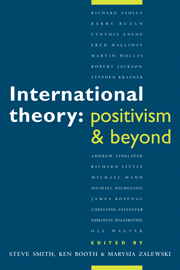Book contents
- Frontmatter
- Contents
- List of contributors
- Preface and acknowledgements
- Introduction
- I Debates
- II Legacies
- III Silences
- 7 The rise and fall of the inter-paradigm debate
- 8 Margins, silences and bottom rungs: how to overcome the underestimation of power in the study of international relations
- 9 Is there a classical international theory?
- IV Openings
- V Directions
- Index
8 - Margins, silences and bottom rungs: how to overcome the underestimation of power in the study of international relations
Published online by Cambridge University Press: 09 March 2010
- Frontmatter
- Contents
- List of contributors
- Preface and acknowledgements
- Introduction
- I Debates
- II Legacies
- III Silences
- 7 The rise and fall of the inter-paradigm debate
- 8 Margins, silences and bottom rungs: how to overcome the underestimation of power in the study of international relations
- 9 Is there a classical international theory?
- IV Openings
- V Directions
- Index
Summary
When I think about what it is that seems so unrealistic (yes, that loaded term) in most formal analyses of international politics, what strikes me is how far their authors are willing to go in underestimating the amounts and varieties of power it takes to form and sustain any given set of relationships between states. This conclusion, of course, rings oddly. So many analysts, after all, profess to be interested chiefly in power – who has it, how they got it, what they try to do with it. Their profession notwithstanding, I believe that by concentrating so single-mindedly on what is referred to euphemistically as the ‘centre’, scores of analysts have produced a naive portrait of how international politics really (there's that tricky concept again) work.
No individual or social group finds themselves on the ‘margins’ of any web of relationships – a football league, an industry, an empire, a military alliance, a state – without some other individual or group having accumulated enough power to create the ‘centre’ somewhere else. Beyond its creation, too, there is the yearly and daily business of maintaining the margin where it currently is and the centre where it now is. It is harder for those at the alleged centre to hear the hopes, fears and explanations of those on the margins, not because of physical distance – the margin may be two blocks from the White House, four stops on the Paris metro from the Quai d'Orsay – but because it takes resources and access to be ‘heard’ when and where it matters.
- Type
- Chapter
- Information
- International TheoryPositivism and Beyond, pp. 186 - 202Publisher: Cambridge University PressPrint publication year: 1996
- 76
- Cited by



